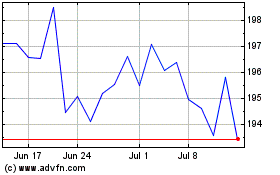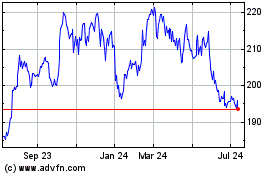CBOE Leans On Index Options As 1Q Profit Slides 7%
May 05 2010 - 2:45PM
Dow Jones News
The Chicago Board Options Exchange is increasingly reliant upon
its stable of contracts tied to stock indexes, a key area of its
business that could be affected by a proposed cap on trading
fees.
The largest U.S. options exchange by volume said that index
options made up nearly a quarter of first-quarter activity, which
was up 2% from a year earlier.
CBOE reported higher revenue but lower profit in what could be
its final quarterly announcement before it details plans for an
initial public offering in June.
Revenue rose 3% to $101.1 million in the three months to March
31, with net profit down 7% at $22.7 million, weighed in part by
IPO-related expenses.
The exchange operator, which reported results late Tuesday via a
notice to member-owners, is pursing the estimated $300 million
float after resolving a long-running legal dispute in late 2009
over ownership rights in the company.
The planned conversion to a shareholder-owned entity comes after
peers in the U.S. exchange sector had already gone public and
consolidated in a flurry of mergers and acquisitions ahead of the
financial crisis in 2008.
Its progress has been closely watched by analysts and investors
seeking to gauge the value of the company, underpinned by a roster
of exclusive licenses to trade options on such benchmark stock
indexes as the S&P 500 and the Dow Jones Industrial
Average.
CBOE reported a $3.5 million rise in transaction fees for the
quarter thanks to higher trading volume and a rise in the average
fee paid per contract, helped by customers' increased use of
index-based products, which made up 24.4% of total contracts traded
for the quarter.
Those options represent CBOE's biggest profit center and a
commanding advantage over rivals, but they come with potential
risks. Growth in nonexclusive options contracts tied to stock
indexes has outpaced CBOE-specific products in recent years, and
the rival International Securities Exchange has launched legal
action to loosen CBOE's hold on the market.
Another potential headache is the 30 cents-per-contract limit on
options trading fees proposed by U.S. securities regulators. This
could cost CBOE between $14.2 million and $23.9 million in annual
revenue, according to estimates from the exchange and the
Securities and Exchange Commission.
The SEC, which proposed the rule in mid-April, aims to align the
cost of buying or selling options more closely with the price
quoted at an exchange.
The agency is seeking comment from the industry on the matter
until June 21. CBOE, alongside other options exchange operators,
plans to voice is opposition.
The price of memberships at the CBOE has come down following the
SEC's rule proposal, with a seat on Wednesday selling for $2.35
million, down from a recent high of $2.95 million following the
mid-March IPO filing.
CBOE said employee costs rose $2.9 million in the March quarter
from a year ago, partly due to higher severance expenses tied to
targeted staff reductions. Results also included a $1.5 million
rise in legal expenses related to the planned shift to a
shareholder-owned structure.
The rise in index options volume contributed to higher royalty
fees, which climbed $2.9 million for the quarter.
-By Jacob Bunge, Dow Jones Newswires; (312) 750 4117;
jacob.bunge@dowjones.com
CME (NASDAQ:CME)
Historical Stock Chart
From Jun 2024 to Jul 2024

CME (NASDAQ:CME)
Historical Stock Chart
From Jul 2023 to Jul 2024
